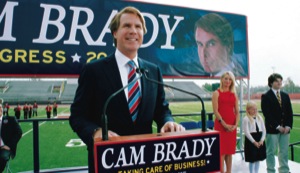
The Campaign
In case you haven’t noticed, we’re smack dab in the middle of the silly season. This is the period during a political campaign when the promises, claims, attacks and revelations get so desperate and weird and implausible that “silly” is the only word that really describes it all. A few weeks ago, not too many people noticed the release of The Campaign, a broad comedy about the silly season that depicts a congressional race between Will Ferrell and Zach Galifianakis. It is not as merciless a satire as American political campaigning deserves, but it is at times absurdly funny and at times much more politically pointed than a big studio movie is usually ever allowed to be. Instead of watching the horrible political theater of the conventions this week, I suggest going to see The Campaign; it’s funnier and less upsetting, since it’s fiction and the good guys win in the end.
Will Ferrell plays Cam Brady, a four-term congressman who is running for re-election in his North Carolina district without opposition. Brady is a dolt and a cad; he’s basically Ron Burgundy as a politician. But he’s easily influenced by the Motch brothers (Dan Ackroyd and John Lithgow), two billionaire industrialists who are only vaguely different from the real Koch brothers, who single-handedly created the Tea Party movement and are planning to buy the White House for Mitt Romney. When Brady gets caught in a particularly stupid sex scandal, the Motches decide they need to run someone else against Brady, and the patsy they choose is Marty Huggins (Galifianakis), the supposedly dim-witted son of one of their business associates. Marty’s entire civic experience comes from running a small town tourism office, while Brady is a veteran politician without a shred of ethics. To prevent a bloodbath, the Motches hire the snake-like fixer Tim Wattley (Dylan McDermott) as Huggins’s campaign manager. Brady has Mitch (Jason Sudeikis) as his campaign manager, and he ignores everything Mitch tells him to do.
Much of the film is a spy vs. spy competition to see who will do the most ridiculous thing to sabotage the other candidate. Brady makes an ad claiming Huggins is an Al Qaeda terrorist, and Huggins asks Brady to recite the Lord’s Prayer at a debate, and when Brady fails spectacularly, Huggins claims he’s not a real Christian. And then it gets crazier, with baby punching, drunk driving arrests and a sex tape. And then they use each other’s families against each other.
Writing this list, I think it doesn’t sound as nutty and comedic as it actually is. It’s a Will Ferrell movie, and if you liked the sort of momentum-building bits from Talladega Nights and Anchorman (using, for example, foul-mouthed children and anthropomorphized dogs), you’ll laugh out loud at the Brady and Huggins campaign tactics. Unlike those movies, however, there are serious issues being discussed in the movie – in particular the wholesale takeover of politics by sociopathic hyper-rich capitalists – and it’s surprising how not far from actual campaigning The Campaign is. Dealing with similar issues, the HBO series Veep, with Julia Louis-Dreyfus as the vice president, is much funnier, but the shows shy from the pointed political commentary that The Campaign embraces.
Will Ferrell is playing the same character he perfected in Talladega Nights and Anchorman, and I still find that funny, if uninspired. Galifianakis is fantastic, however. Playing a nebbishy, vaguely effeminate idealist with two desires – to promote his hometown and please his father – Galifianakis is both dorky and sympathetic, even when Huggins starts acting like Brady. Part of this is that his relationship with his plump, wholesome wife is the emotional center of the film. She’s the most believable character, and when she convinces him to stand up for his ideals, it’s not as inspirational as it might be in a Capra or Sorkin film, but it is decidedly not silly. v











